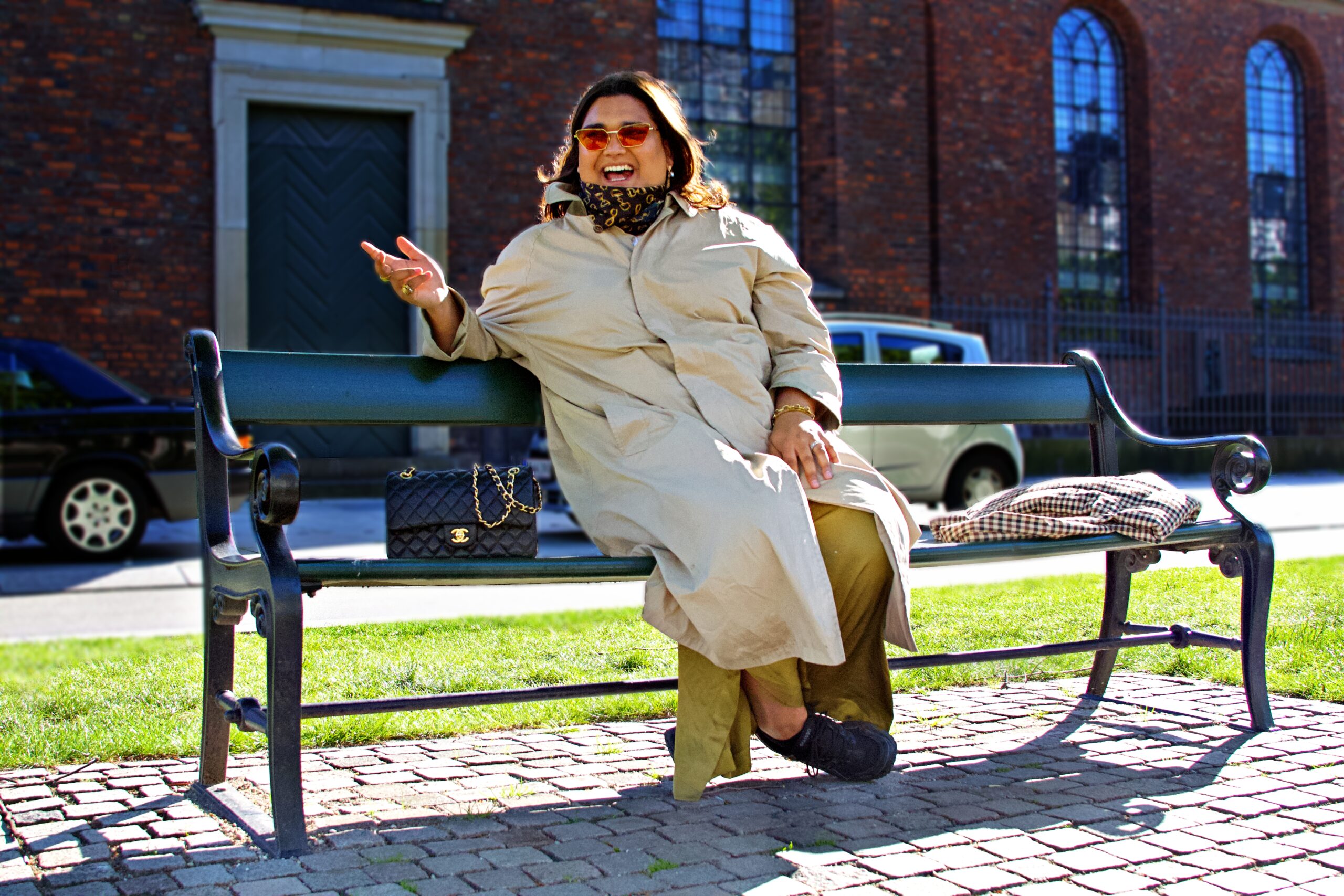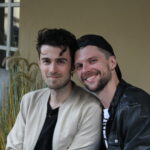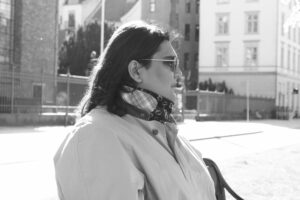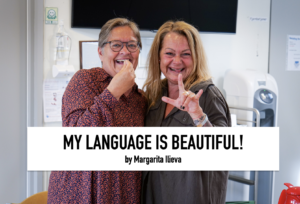Denmark, and its capital Copenhagen, is often seen as a safe space for LGBTQ+ individuals, including transgender people. After Ellen Elina got kicked out by her family and abandoned by her friends, the city ended up being just that for her. Now, she’s facing new obstacles in the health sector, her dating life and society at large.
By Nina Schaumann

For Ellen Elena Kovac Nielsen, who is now 22, she has always known that something was up, but when she was 17, back when she still went by her ‘deadname’ Andreas, she started to think that something was wrong. In the beginning, she came out as gay.
That lead to people wanting to be her friend, just because they could have a ‘gay best friend’, and now she was suddenly a cool and unique person.
“In Odder, if you just stick out a bit, people will look at you and there will be talking a lot about you like there would be like ‘Oh my God, have you heard that blah blah blah?’ And then if you’re hooking up with someone, everyone knows.”
In August of last year, she decided to come out as transgender to her family.
“They didn’t take it well. They actually kicked me out, and I lived in a suitcase travelling from friend to friend until it was too hard to bear. I couldn’t live like that, so I went back to my parents and said, ‘This is just a phase, my name is Andreas’.”
Now she lives what she calls a double life, where in Copenhagen, she can be herself, but back in Jutland, she has to hide.
“I really was struggling”
When Ellen Elina decided to come out as transgender, she lost some friendships along the way, both people from her high school and her best friend through 10 years:
“He just couldn’t be around me or understand it, and I said that’s totally okay, but I’m happier and more at peace with myself. Before I was always confused and had a lot of mood swings. It made me confused and angry, because why can’t you accept me when I talk about my complications, my worries and my frustrations.”
To cope with the situation, she started drinking every day and developed a drinking issue.
“It wasn’t just two beers; it was like skinny bitches and vodka all day long. I didn’t know how to deal with everything, I just lost some of my dearest friends, I was kicked out, the whole world just fell apart,” she explains, and continues:
“I was really struggling mentally, and it’s weird because I’ve never felt that before. Everyone has always known me as this happy and strong, motherly person. Now it’s confusing for me and them to see me being very vulnerable. Because I’m finally happy with who I am, but I don’t have the confidence anymore”.
According to her, that inner turmoil is brought on by the abandonment and not being done with her progress.
It wasn’t till she found comfort in one of her closest friends and when her sister finally accepted her, that she was able to pull herself out of that slum.

According to Stinne Bogh, a Danish psychologist working with transgender people, it means everything to have some kind of support network.
“Sometimes, that would be me, but other times, it’s their friends or family. I think the hardest period is in the initial figuring everything out, where I normally meet them, because society might misgender you.”

Getting the green light
In the Danish health sector, transgender people get a reference from their own doctor to one of the three sex clinics in the country. Here, they can be asked questions such as “Have you ever had or fantasized about having sex with minors?” and “Do you ever think about your parents when you masturbate?”. That is showcased in a 2016 report put forward by anthropologist Christian Groes from the Danish university RUC and covered by Amnesty international.
Ellen Elina called her own process a lucky one, where she wasn’t asked those questions. But her friend reports going ‘through hell’ in her process.
She started speaking to her doctor, who sent her to a sex clinic and she talked to a psychologist.
After some personal tests with different questions for her, her family and friends, she got the green light to get hormones. But not everyone gets approved by the clinics, leading them to buy the hormones illegally or take their own life.
“There are a lot of people, who have to deal with a lot of stuff or getting a rejection.
Many people are suicidal, and it’s sad that some people are taking their own life because some doctor is saying it’s not true.
“When you talk to a psychologist at the sex clinic, you have to say, ‘I’m gonna kill myself if I can’t have hormones or if I can’t get the surgery’, in order for them to take you seriously. I do understand that it is a serious topic, and there are people who go through phases, so they have to be very sure that this is what you want because you can’t just stop. But why should it be SO hard?”
Psychologist Stinne Bogh backs this up, saying that people can’t show any doubts they might have about being trans at the sex clinics, and oftentimes to their friends and family:
“In that way, my clinic is a safe space, where they can reflect on their thoughts. You can say, that in that way I’m the least dangerous person to tell because if I was to be an asshole or wouldn’t accept their identity, they can always leave. In that way, my clinic is a safe space, where they can reflect on their thoughts, and for a lot of them, they need just that.”

Problems can come up
Ellen Elina is passionate about playing music and singing. She went on hormones for a while, but because there was a risk of it affecting her singing voice, she stopped. The hormones will make her go through a second puberty. Now she’s trying to get back on them, and she’s currently in the process of getting her bottom surgery, a process that can take years to finalize.
Before people can get the green light, health care professionals run medical and psychological tests. And if and when someone is accepted, they’ll have to wait, because only one surgery takes place every second or third month. Ellen Elina doesn’t know how many people normally are on the waiting list, but her friend was put in at number 10.
In Denmark, hormonal treatment and bottom surgery is free and seen as medically necessary. But a potential boob job is paid for out of pocket.
She doesn’t feel too afraid about getting the surgery, which is risky and dealing with a delicate area.
Simon Gjerløv, a Danish psychologist and transgender man, who used to work for LGBT+ Denmark and worked to remove transgender from the list of mental illnesses, talks about his experience with getting a botched surgery.
“I’ve had to have over 20 surgeries to try and correct it. It’s been a true horror film. Frankly speaking, the surgeon in charge of them is not competent enough, but the job is prestigious. They only started doing them on a big scale in Denmark within the last couple of years,” he says.
We reached out to the three sex clinics, but none of them were able to comment on the accusations put forward.
Minding her own business
Last summer, Ellen Elina decided to move to Copenhagen. She got offered a job as a team manager at a café, so she saw no reason to stay in Odder.
“I just needed to find a place to live, and I thought, well, that’s easy. It was not easy. You really have to be out there with your elbows, like ‘pick me, choose me’.”
She doesn’t know a lot of people in Copenhagen yet, but she doesn’t mind that. And the support and company from her friends are very important to her.
“I can have a quiet, peaceful life. I can design my life as I want over here. I have all these beautiful and amazing human beings, but I don’t have them around me all the time. And while I don’t think they understand it because they didn’t go through it themselves, they’re trying to understand it and they try to be there as much as they can. And that’s what I need.”

In Odder and Aarhus, she couldn’t leave her home without people greeting her. She likes the fact that now she can put on her headphones and go out, enjoying her own company.
In the future, she hopes to meet more like-minded people who accept her.
“I want to build my community like I did in Jutland, but I want to build it as Ellen Elina, not as Andreas.”
Feeling safe in Denmark
In Copenhagen, there’s a big LGBTQ+ community, and Ellen Elina points out, that a lot of people move to the city for that reason. According to her, there are more options to be yourself and feel accepted.
She also points out, that while people are living their own life, they still are a tight community.
“Many people are holding onto and know each other. I got here during the pandemic, so I haven’t been able to experience it that much, but I know people find friends for life within the LGBTQ+ community.”
Normally, there’s a big culture for arranging events over Facebook and meet people that way.
“As a whole, I think we’re more forward when it comes to the acceptance of trans people. Denmark was the first country to legalize porn. We’re open-minded in general.”
She laughs and adds, that Danes are also very reserved on the other hand when it comes to interacting with strangers:
“So yeah, like in general, I think generally is a great country to be a part of the LGBTQ+ group”.
“I love sex, but I need to protect myself”
For Ellen Elina, dating can be challenging, as she needs to be wary of people’s intentions:
“I always fear, are you with me because this is a fetish you have or are you with me because you feel pity or stuff like that. Or do you think I’m interesting, or my personality is your cup of tea?”
Because of this, she has a rule not to have sex till the 4th or 5th date.
She’s unsure if she would tell her partners that she is transgender, once she’s had her bottom surgery. At least, it depends on the kind of relationship they have.
“I can’t bear my own kids, but if it’s just a fling, I don’t feel the need to tell them. But if it’s someone I see a future with, it’s not fair. Say that you’ve been with this person for 2 or 3 years, and now you are thinking about kids. Will you then have to tell them ‘Oh, I actually can’t’.”

“I hate my penis”
Generally, she feels like other people are too hyper-focused on her genitals, even if they are strangers or have no sexual relationship with her.
“I think like, why? Why is it so important for you to know what I have? For a lot of transgenders, it’s an uncomfortable thing to talk about, because they don’t see it as a part of them. Why do you have to set your focus on what’s between my legs, instead of ‘how are you, who are you’?”
For her, having a penis makes her feel very uncomfortable, she always felt a hatred, a distance towards it:
“Anal sex is my way of making it work, I don’t like people touching my penis or looking at it. And fingering, kissing, touching other places.”
But another friend she has wants to keep her penis.
“I kinda don’t get it, because I don’t know if it’s in my head, but I always wanted a vagina, always. Because that’s the most important thing for me. But in general, it isn’t that important what’s in-between your legs.”
Oh, that’s a transgender
Ellen Elina is featured in the TV program “Skamløs” (Shameless) on the Danish public service media DR. It focuses on three young, sexually liberated women, who talk about their experiences with being judged for just that. Ellen Elina is a friend of one of the protagonists. Because of that, people come up to her and say, ‘Oh my God, you’re the transgender, right?’ or shout things like ‘Hey, you’re that trans person’.
“I don’t understand why they have to be confirmed in what they just saw. Can you just be like ‘Oh, that’s Ellen, she was amazing or fun or whatever, stuff like that, not ‘Oh, that’s a transgender, how cool’.”
Asked about whether she would have preferred to have been born a cis woman, she is quick to answer, that she indeed would have preferred just that.
“There’s one thing that always is a kick in the stomach, and that is the fact, that I can’t bear and give birth to my own children. I envy people get their period because while it isn’t comfortable, it shows that you’re healthy. When I see pregnant people, I envy them so much.”



